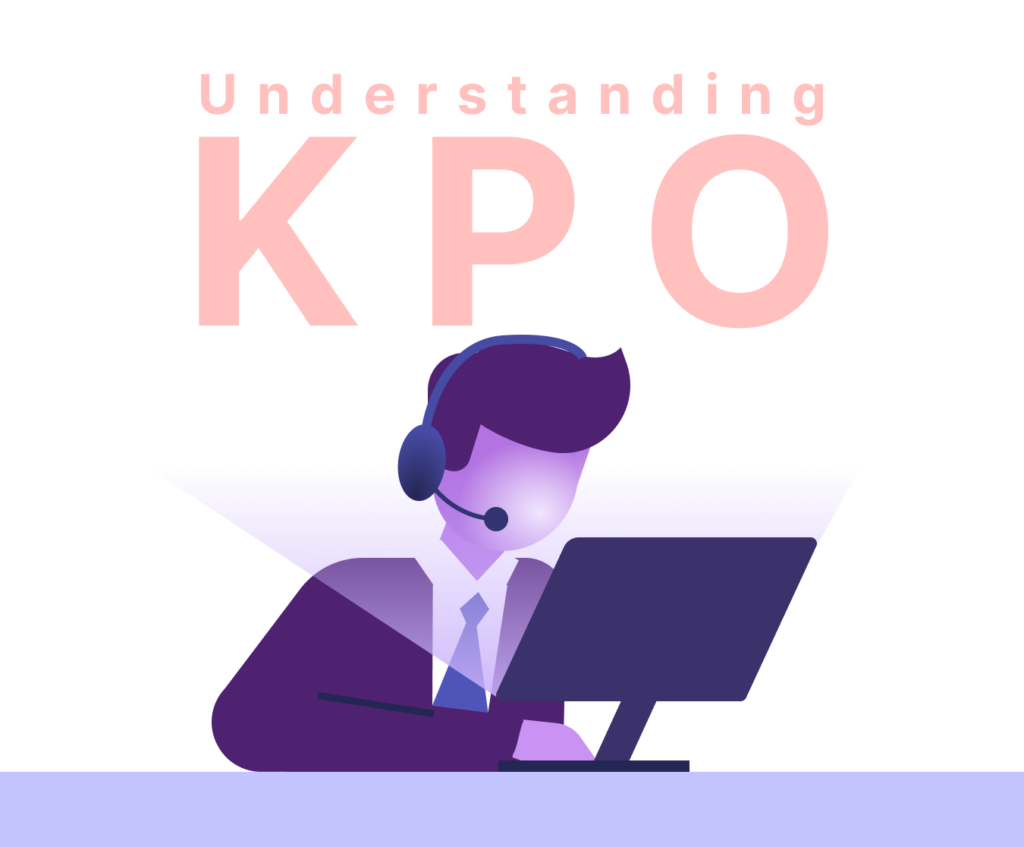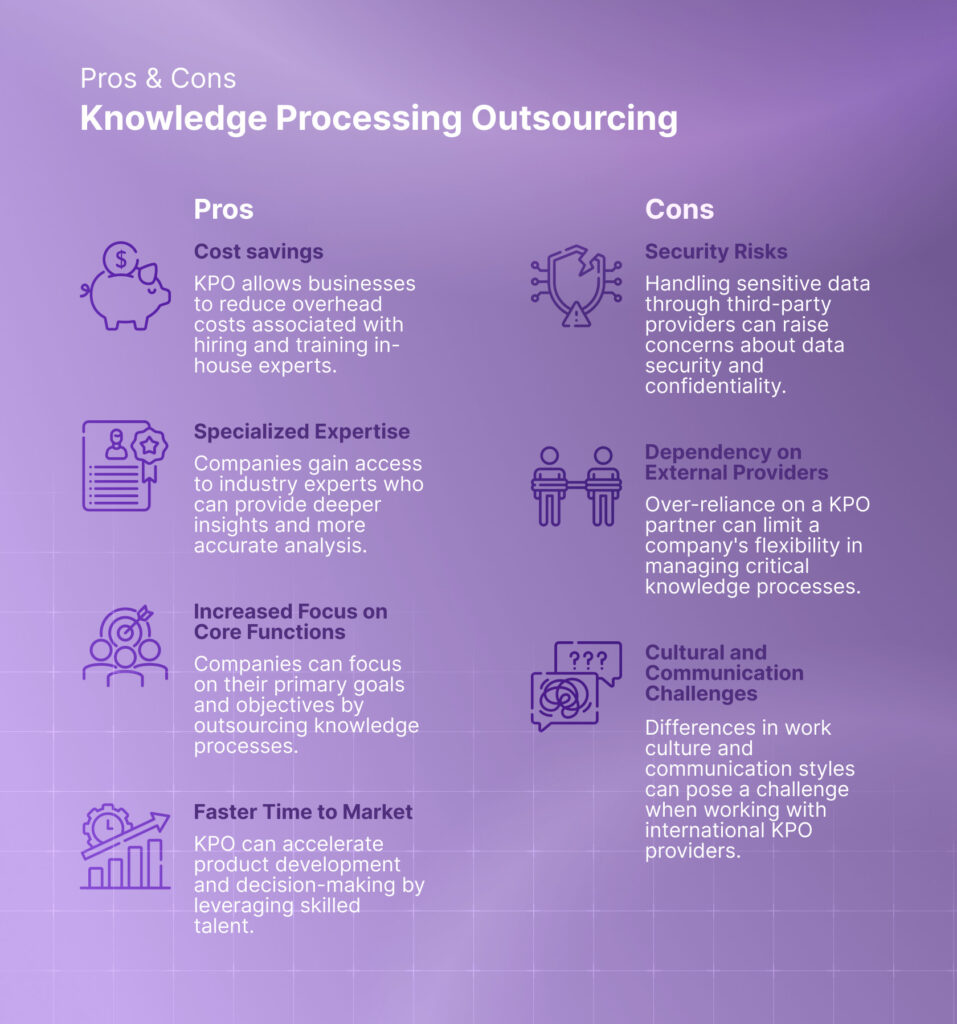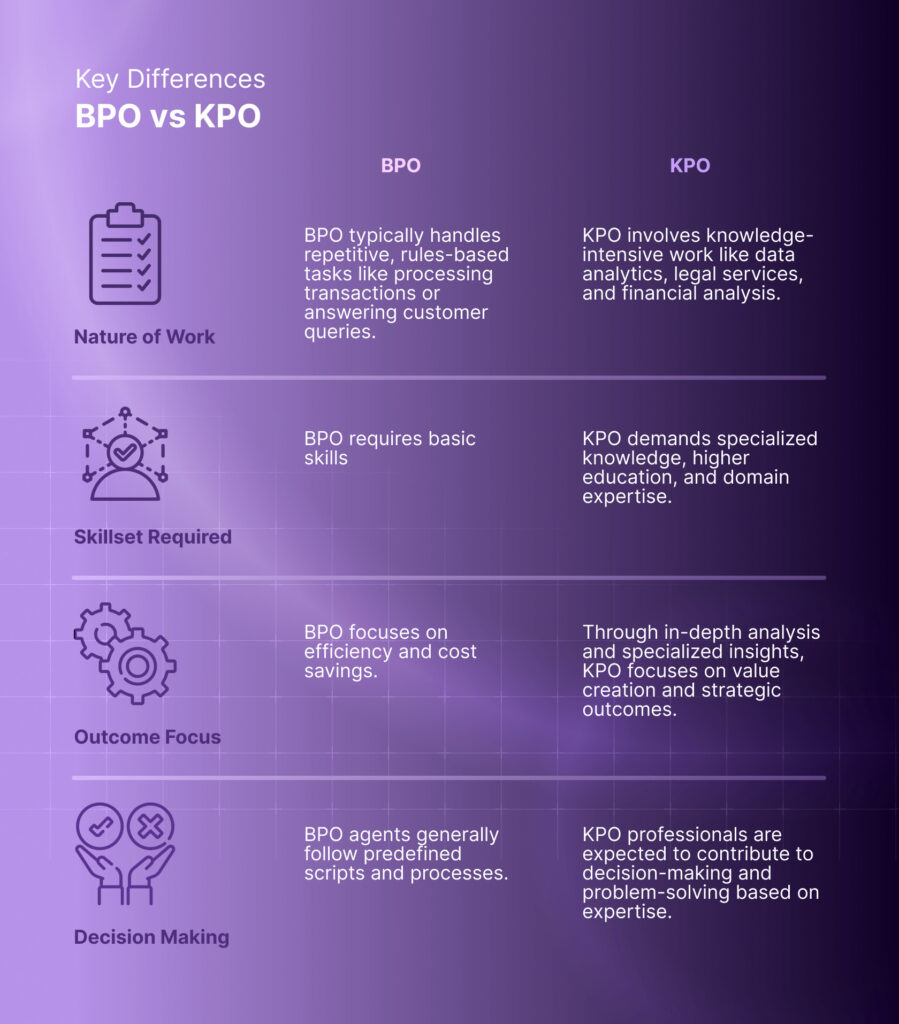
As per Grand View Research, the global Knowledge Process Outsourcing industry is projected to grow at a compound annual growth rate (CAGR) of 17% by 2025, underscoring its significance in today’s business landscape.
While exploring key examples and the role of technology in enhancing KPO efficiency.
Table of Contents
- What is Meant by Knowledge Process Outsourcing? And Its Example?
- What is the Purpose of KPO?
- Advantages & Disadvantages of KPO
- Difference Between KPO and BPO
- Reasons to opt for Knowledge Process Outsourcing (KPO)
- How to Choose the Right Knowledge Process Outsourcing Provider
- The Role of Technology in Enhancing KPO Services
- Conclusion
What is Meant by Knowledge Process Outsourcing? And Its Example?
KPO Knowledge process outsourcing (KPO) includes services such as financial analysis, market research, legal process outsourcing, healthcare data analysis, and more. It is the practice of outsourcing high-level, knowledge-intensive tasks to external vendors or specialized third-party providers.
KPO helps to explore real-world examples. Its services include:
- Financial Research & Analysis
Investment banks and financial firms outsource tasks like equity research, financial modeling, and portfolio analysis to KPO firms.
- Legal Process Outsourcing (LPO)
Law firms outsource document review, legal research, and compliance tasks to specialized KPO providers.
- Market Research & Consulting
Companies in various industries rely on KPO firms for in-depth market research, competitor analysis, and customer behavior studies.
- IT Services
Data management, software development, and technology consulting.
What is the Purpose of KPO?
The primary purpose of knowledge process outsourcing is to provide businesses with access to skilled talent, advanced technology, and deep domain knowledge.
- By outsourcing these critical tasks, companies can:
- Improve business agility and scalability
- Focus on core business activities
- Reduce costs associated with hiring and training in-house specialists
- Leverage global talent and time zone advantages
Advantages & Disadvantages of KPO

Advantages
- Cost Savings
KPO allows businesses to reduce overhead costs associated with hiring and training in-house experts.
- Specialized Expertise
Companies gain access to industry experts who can provide deeper insights and more accurate analysis.
- Increased Focus on Core Functions
Companies can focus on their primary goals and objectives by outsourcing knowledge processes.
- Faster Time to Market
KPO can accelerate product development and decision-making by leveraging skilled talent.
Disadvantages
- Security Risks
Handling sensitive data through third-party providers can raise concerns about data security and confidentiality.
- Dependency on External Providers
Over-reliance on a KPO partner can limit a company’s flexibility in managing critical knowledge processes.
- Cultural and Communication Challenges
Differences in work culture and communication styles can pose a challenge when working with international KPO providers.
What is the Difference Between KPO and BPO?
Here are the key differences between knowledge process outsourcing (KPO) and business process outsourcing (BPO):

| Difference | Business Process Outsourcing (BPO) | Knowledge Process Outsourcing (KPO) |
| Nature of Work | BPO typically handles repetitive, rules-based tasks like processing transactions or answering customer queries. | KPO involves knowledge-intensive work like data analytics, legal services, and financial analysis. |
| Skillset Required | BPO requires basic skills | KPO demands specialized knowledge, higher education, and domain expertise. |
| Outcome Focus | BPO focuses on efficiency and cost savings. | Through in-depth analysis and specialized insights, KPO focuses on value creation and strategic outcomes. |
| Decision-Making | BPO agents generally follow predefined scripts and processes. | KPO professionals are expected to contribute to decision-making and problem-solving based on expertise. |
Reasons to opt for Knowledge Process Outsourcing (KPO)
There are several compelling reasons why companies opt for knowledge process outsourcing:
1. Cost Efficiency
By outsourcing high-level tasks to specialized providers, companies can save on operational costs without compromising on quality.
2. Access to Specialized Talent
KPO firms provide access to global talent with deep expertise, making it easier for companies to tap into the knowledge they might not have internally.
3. Scalability
As businesses grow, they can easily scale their KPO operations to meet increased demand without investing in additional resources or infrastructure.
How to Choose the Right Knowledge Process Outsourcing Provider
Choosing the right knowledge process outsourcing provider is a crucial decision that can significantly impact your business’s performance and strategic objectives. Here are some key factors to consider:
1. Expertise in the Required Domain for Knowledge Process Outsourcing
The KPO provider should have a deep understanding and proven experience in your industry or niche. For example, if you’re outsourcing financial research, ensure that the provider has expertise in financial analysis, forecasting, and reporting.
2. Data Security and Compliance
Since KPO often involves handling sensitive data, it’s vital to ensure the provider follows strict security protocols and is compliant with relevant regulations, such as GDPR or HIPAA, depending on your industry. Look for encryption standards, data protection policies, and regular audits to mitigate risks.
3. Reputation and Client References
Research the provider’s reputation by reviewing case studies, testimonials, or references from existing clients. A strong track record and positive feedback indicate reliability and the ability to meet client needs.
The Role of Technology in Enhancing KPO Service
With the advancement of digital tools and systems, KPO providers can deliver more accurate, faster, and cost-effective services.
1. Artificial Intelligence (AI) and Machine Learning
AI tools help KPO providers quickly analyze large data sets and gain insights. Machine learning enhances predictive models, supporting better decision-making in financial research, legal analysis, and market forecasting.
2. Automation and Workflow Optimization
Automation reduces errors, accelerates processes, and ensures consistency in service delivery across various industries.
3. Cloud Computing
Cloud technology enables KPO providers to store, access, and process large datasets seamlessly. It also facilitates collaboration across borders, allowing global teams to work together in real time.
4. Natural Language Processing (NLP)
NLP enables KPO providers to analyze and process large volumes of text data, making it easier to perform tasks such as market sentiment analysis, and customer feedback assessment.
Conclusion
Knowledge process outsourcing is a powerful strategy for businesses looking to leverage specialized expertise and advanced analytics without investing heavily in in-house talent. However, KPO also comes with challenges like data security risks and dependency on external providers.
For businesses that struggle with monitoring KPO performance or ensuring consistent quality in customer interactions, ConvoZen.AI offers a robust solution. By using real-time monitoring and AI-powered insights, ConvoZen.AI helps call center directors maintain high standards, ensuring that both routine and complex customer inquiries are handled efficiently.
Get started with ConvoZen.AI and transform your operations with a demo!
FAQs
The meaning of knowledge process outsourcing is outsourcing knowledge-intensive tasks, such as financial analysis, legal research, market research, and data interpretation, to external experts or firms that specialize in those areas.
The knowledge process outsourcing industry focuses on delivering high-value services across various sectors such as finance, legal, healthcare, and IT. It involves companies outsourcing specialized tasks that require deep domain expertise and advanced analysis.
Knowledge process outsourcing jobs include roles like financial analysts, legal researchers, market researchers, healthcare data analysts, and intellectual property consultants. These positions require advanced qualifications and expertise in specific fields.


